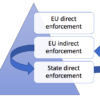Blog Archive

The EU Commission’s report on new genome editing techniques: a treasure trove for sustainable CRISPR food – or a Pandora’s box?
Genome editing in plants can deliver beneficial crop properties such as drought and pest resistance, but the resulting products are also feared by some to lead to health and biodiversity risks in the long term. On 29th April 2021, the EU Commission published its long-awaited report on new genome editing techniques, hinting at deregulation of products resulting from genome editing amidst accusations of aggressive biotech industry lobbying. In this blogpost, Pauline Phoa discusses the legal background to the Commission’s report, as well as some concerns about the way forward.
Read more
Will Directive 2020/1828 on the EU representative action lead to ‘better’ enforcement, as envisaged by the New Deal for Consumers?
The enforcement of consumer law has traditionally been based primarily on private enforcement, complemented by administrative enforcement. Because of longstanding issues of non-compliance with EU consumer rights, the Commission has introduced an ‘EU representative action’. In this tenth and final post in RENFORCE Blog’s special series on the enforcement of EU law, Esther van Schagen summarises the main features of the new Directive and explains some of the assumptions as to the effect of more enforcement which underlie the Directive and become visible in the impact assessment. Arguably, the Directive has overlooked opportunities that could have contributed to managing key barriers to bringing collective actions – the complexity, length and costs of collective redress – and which ought to be addressed in order to enhance cross-border enforcement.
Read more
For EU law enforcement strategy and theory building!
Calls for EU law enforcement are a common and logical response to address recent challenges – and crises – across multiple policy sectors, but may face constraints of a legal, political and practical nature. According to Miroslava Scholten, these constraints are exactly where we all need to focus in order to ensure the resilience of the EU into the future. Today, on May 9, the Day of Europe, we make a start of a special blog post series by RENFORCE experts to put the need for more and better enforcement of EU law in the spotlight. Check our blog page out in the coming days!
Read more
The New Pact on Migration and Asylum: a paradigm shift in regulation and enforcement?
Salvatore Nicolosi and Paul Minderhoud
Last September 2020, the European Commission unveiled the New Pact on Migration and Asylum to commit the EU and its Member States ‘to build a system that manages and normalises migration for the long term.’ A fierce criticism has been already raised by scholars and civil society, claiming that this political platform is all but new and definitely unfit for the ‘fresh start’ sought by the Commission. In an attempt to contribute to this thriving debate, this post raises doubts on whether the Pact constitutes an effective paradigm shift in regulation and enforcement for EU asylum and migration law. As will be illustrated, the Pact reflects a regulatory framework that does not fix the existing divergences between the Member States, while at the enforcement level the approach is still precarious both as to the role of EU agencies and a strategy to ensure Member States compliance.
Read more
In search for an enforcement strategy for the Common European Asylum System
By Salvatore Nicolosi
The reform of the Common European Asylum System (CEAS) is one of the major regulatory challenges to the European Union (EU), which has continuously attracted academic attention (Nicolosi, 2019). Less consideration has been given to the dynamics of enforcement of that policy. Yet, this is a crucial issue, as acknowledged by the European Commission, the migratory pressure of the most recent years stressed the ‘structural weaknesses and shortcomings in the design and implementation of European asylum and migration policy.’ Apart from a ‘protracted implementation deficit,’ EU asylum law has been suffering from a ‘protracted compliance deficit’ (Thym, 2017). This makes the need for a more effective enforcement strategy all the more urgent. This post, therefore, aims to explain whether EU direct enforcement mechanisms can be more effective than traditional forms of enforcement by State authorities.
Read more
Ambtelijke fusies tussen gemeenten opgelet: einde aan de verruimde btw-vrijstelling?
Door mr. Willem A. Janssen & mr. Nathan Meershoek
Overheden krijgen vaak te maken met fiscale wetgeving. Zo kan er een verplichting bestaan om btw af te dragen wanneer overheden samenwerken. De interpretatie van dit fiscale kader is sinds 15 september jl. in beweging. Uit een Kamerbrief van de staatssecretaris van Financiën blijkt namelijk dat gemeenten, die samenwerken op basis van een ambtelijke fusie, vanaf 1 januari a.s. mogelijk weer btw moeten gaan betalen over de geleverde diensten.
Read more
Better mutual recognition for better results on asset recovery: A new Commission’s proposal
 Just before Christmas, with the objective of further enabling Member States to deprive criminals of their illicit gain, the EU Commission proposed the adoption of an(other) instrument in the field of freezing and confiscation of assets deriving from criminal offences.
Just before Christmas, with the objective of further enabling Member States to deprive criminals of their illicit gain, the EU Commission proposed the adoption of an(other) instrument in the field of freezing and confiscation of assets deriving from criminal offences.
Due also to obligations under international and EU law, asset recovery laws and strategies – in particular against organised crime – have been increasingly adopted by contemporary criminal justice systems. Attacking criminal wealth has, indeed, a strong preventive and strategic dimension: focusing on the property of criminal organisations, for example, helps law enforcement authorities reach through their top, and it gives more tools to neutralise and dismantle them. The idea that asset recovery is essential to tackle these organisations has been lately coupled with the conviction that it is helpful against terrorism, too. The Commission proposal was indeed announced at the beginning of 2016 with the ‘Action Plan for strengthening the fight against terrorist financing’.
Read more
Exciting times for the EU implementation of RENFORCE efforts for the future proof protection of minors online
Coming from the Molengraaff Institute of Private law (REBO), I feel very much connected to RENFORCE and its work. From my early days as a PHD student, my focus has been on how regulation and supervision can deal with disruptive technology in a future proof way. How to support innovation on the one hand and to protect vulnerable consumer interests on the other, has been the leading theme in my work both in academia and for society. Since this is one of the key themes of RENFORCE, I always feel very much at home, but the last six month have been extremely exciting existing in this respect.
With and trough RENFORCE we have initiated many very valuable projects. One of these initiatives is the project on the EU regulation of the protection of minors on all platforms and media against harmful, violent content. What is the optimal regulatory mix to guarantee protection of our beloved children on the one hand, whilst avoiding stifling innovation of the promising converging media on the other? A RENFORCE Conference on the topic as well as a peer reviewed publication formed the basis of my input in the recent update of the Directive on audio-visual media services, input I could give both as a RENFORCE law professor and as an ERGA chair[1]. I was extremely grateful to learn that the academic effort was fully acknowledge by the European Commission in its text for a New Directive for Audio-visual media services. A perfect valorisation of RENFORCEs academic efforts.
Read more
Why is “four” better than “three” when it comes to the lines of defence in financial institutions?
Certainly one of the greatest banking scandals of any age, the LIBOR fraud rocked the global financial industry. Manipulating interbank interest rates for almost two decades, the scale of the LIBOR deceit was staggering: 3 continents, 10 countries, 20 banks.
How could that happen on such a massive scale?
What LIBOR and other crises have shown is that banks need to enhance corporate governance measures. Most importantly, such incidents have led to a further prioritisation of governmental and supervisory agendas relating to the potential systemic implications of weak internal control systems, shifting the focus from the soundness of individual financial entities to the integrity and stability of the whole financial system. As Schwarcz maintains, the sheer perils financial supervisors have currently to cope with are attached to the risk “that a trigger event, such as an economic shock or institutional failure, causes a chain of bad economic consequences—sometimes referred to as a domino effect”. Systemic risk, indeed.
Read more
Loting soms ondeugdelijk en niet doeltreffend
 Bij aanbestedingen wordt een aanbieder gecontracteerd die de goederen mag aanleveren of de dienst of het werk mag uitvoeren. De beste aanbieding wint. Soms wordt er bij aanbestedingen geloot: wat vinden we daarvan?
Bij aanbestedingen wordt een aanbieder gecontracteerd die de goederen mag aanleveren of de dienst of het werk mag uitvoeren. De beste aanbieding wint. Soms wordt er bij aanbestedingen geloot: wat vinden we daarvan?
Loten bij aanbestedingen komt ten minste bij twee onderdelen voor: om aanbieders te kiezen die een offerte mogen opstellen of om de winnaar(s) te kiezen.



